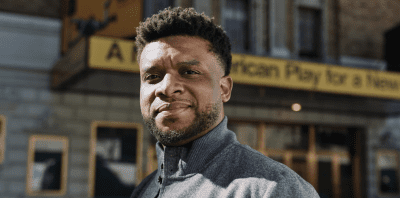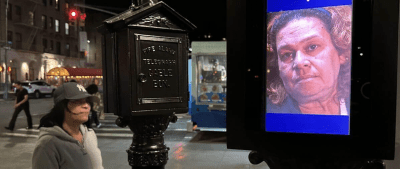Still from 'Cyrano' courtesy MGM
‘Words as little daggers’: A chat with the lyricist on ‘Cyrano’
Carin Besser, who also writes forThe National, discusses working at the New Yorker, crafting songs for Peter Dinklage—and the Milk Bar
Edmond Rostand’s 125 year-old play “Cyrano de Bergerac” is the story of an emotional swashbuckler who believes his massive nose repels his beloved Roxanne. It never goes out of style. And why would it? It’s not like grace has surpassed judgment in the dating pool.
The newest movie version of Rostand’s play makes three adjustments from what audiences are used to seeing, and the first is a stroke of genius. This Cyrano (played by “Game of Thrones” favorite Peter Dinklage) has a normal sized nose but he’s, well, short. Second, the movie is called “Cyrano” to reflect contemporary language, and lastly, it’s performed as a musical with score and songs by The National’s Bryce and Aaron Dessner, and Matt Berninger and Carin Besser. The changes update Rostand’s play without ruining anything that makes the story great.
“Cyrano” started as an off-Broadway show in late 2019, adapted and directed by Dinklage’s wife Erica Schmidt. The National’s Berninger and Schmidt put the songbook in motion, and Bergniger’s wife and co-lyricist Carin Besser joined the production soon after.
The ensuing musical ran from November to December 2019 and closed before covid took over.
Cut to June 2020, four months into lockdown. Filmmaker Joe Wright (“Pride & Prejudice,” “Atonement”) received the latest draft of “Cyrano” for the screen with the accompanying music. What he read and heard convinced him that the time was right to begin shooting in spite of the pandemic.
“As we sat in isolation, it seemed to me that what we needed most was simple human connection. ‘Cyrano’ had to be made,” Wright tells Brooklyn Magazine. “All three of the film’s central characters are attempting connection and failing to do so. All three are in love but feel unworthy of the love they seek. Their sense of self gets in their way. And yet the attempt is all.”
The lyrics provided by The National put those sentiments expertly to music. Bonus: the score makes for a compelling substitute for a new album from the band.
Brooklyn Magazine spoke with co-lyricist Carin Besser. Imagine the task of writing for Cyrano: Cyrano doesn’t need a Cyrano. He’s Cyrano! And yet here we are. We discuss songwriting, working at the New Yorker, her favorite place to eat in the borough, and collaborating with Dinklage.
This interview has been edited for flow and concision.


Besser
You worked as an editor for the New Yorker, you write lyrics with The National, and you co-wrote the lyrics for the new movie adaptation of “Cyrano.” You really work a lot with words.
I do, that’s true. [At the New Yorker] I was in the fiction department. It was the world’s greatest job, not gonna lie. I read short fiction all day long. That is an exciting place to be, if you are at all interested in words, just the sheer pleasure and brilliance of the editors, to the copy editors. Being able to work in a place where everyone cares that much—and they always care that much every week—it’s such a rare thing. I still miss the feeling of getting a proof from a copy editor who just solved all the sentence problems that you couldn’t solve and getting to enter those into the text at the last minute.
How did you start writing lyrics with the band?
I was at the New Yorker when I met Matt so it was very natural to me that he was writing in notebooks, all the time, while we were living together. I was always writing in my way too, and having opinions, lots of opinions, because it was sort of my job to have opinions. I was so taken with everything the band was making that it was easy to get involved in and try to be helpful where I could or contribute lines when I could. But it was also not ever really my focus.
What’s your lyric writing process?
I can come in and just work a little bit myopically and try to find the parts of it that I find most interesting. I tend to generate a lot and then trust that my collaborators can kind of help me shape it or help make it work. The thing that I figured out is simply that it’s never going to feel like you know what you’re doing and that it’s okay. Because to be honest, so far, I feel like every song I’ve worked on or tried to write by myself, they are always coming from a slightly different place. They make different demands on you. Their logic is different. The amount of revelation or lack of revelation they want is different. I think what probably keeps me interested in doing it is that I never feel like I’m any good at it.
Despite that feeling, do you have a favorite song in the movie?
Absolutely, but I have to say that it was one that I had almost nothing to do with. And it’s the song “Wherever I Fall.” For me that’s the song. What I find so interesting about the way the movie functions is I can really hear what the director Joe Wright understood because Joe was involved so early on in the process, and I think I really got the sense once we were all working together. When I saw the movie, I thought, “Oh, he just did this beautiful shaping leading us to this song.” All of the color has drained, and those voices in that fully finished song … I think some of the other songs function more as these characters are trying on ideas of love. It’s kind of great that every once in a while the melodies even feel a little familiar or borrowed and the character’s notions of love are feeling a little familiar and borrowed. That’s when the whole project’s idea of what love has actually meant and has actually been and how different that is from the romantic ideas that you start out with.
Did you and Matt work with Peter Dinklage to shape the songs to fit Peter and his character?
Peter is so incredible, and was from the beginning. For an actor, especially a stage actor who’s acted in so many different mediums, the voice is so important. We felt really confident because we like non-singery singing. There was definitely a desire on our part to make sure that the songs suited the singers as much as possible. For instance, the very first song that Peter performs is “When I Was Born,” what Matt and I were calling the insult song. That was the one song where it was actually very hard to make it work. Partly because he’s literally in a sword fight and so getting that to work physically, we wanted this fast, insult-laden song and we wanted to do something that the poems would have done. Which shows you his vast resources of not just sword fighting panache and skill, but the actual ways that he can use words as little daggers. That song is about like, “you want to insult me? There’s nothing you can say that I can’t make even more devastating to myself.” But it’s hard to pull that off in a song and not have it fall into too regular a rhythm that you start to anticipate it. That was one where I think Peter really had to help us make it work.
People naturally associate The National with Brooklyn, so I have to know your favorite restaurants in the borough.
When we had our daughter, we lived in Prospect Heights, and coffee was just the most important thing to us at that time. Coffee and someone else making you breakfast, like a croissant sandwich because you’re just so tired. So pretty much every day we went to this little place called Milk Bar. It was brand new back then. We even shot a really early music video there. So that’s a place I have a lot of love for and deep love for the owners.
You might also like 


























